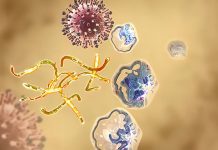
Dr Jason Mellad, chief executive officer at Cambridge Epigenetix, discusses the emerging field of epigenetics-led diagnostics and personalised approaches to medicine.
The exciting and rapidly evolving area of epigenetics is advancing the possibilities for medicine well beyond the realms of the genome, bringing a new generation of diagnostic and therapeutic innovations that offer hope for many patients living with life-threatening diseases.
Exploring epigenetic mechanisms
Epigenetic research examines mechanisms of gene regulation that do not alter the underlying DNA sequence. These processes are usually reversible and include chemical changes within nucleotide sequences, such as methylation, or histone and RNA modifications.
Epigenetic modifications occur in response to environmental factors and may be inherited. For example, our epigenome will be altered by exposure to certain pollutants, hormones or lifestyle factors (e.g. diet). Some epigenetic alterations provide an evolutionary advantage, while others trigger abnormal cellular pathways that lead to disease or degenerative processes associated with ageing.
Studies in identical twins have shown that, despite sharing identical DNA sequences, these individuals often go on to develop different diseases or health issues.1,2 This is because the expression of their genes has diversified over their lifetime as a result of differences in their environments, experiences and lifestyle choices. Epigenetic changes that have occurred in response to these factors have altered the regulation of certain genes. This provides an indication of the scale and impact that epigenetic changes may have within our cells, tissues and biological systems.
Discovery of a number of precise and powerful chemical changes within DNA sequences, including 5-methylcytosine (5mC) and 5-hydroxymethylcytosine (5hmC), have advanced scientific understanding substantially.1 Abnormal patterns of DNA methylation have been identified in a number of aggressive cancers, as well as inflammatory, metabolic and neurodegenerative disorders.3,4
A new generation of diagnostics
Epigenetic modifications are stable and provide strong signals as biomarkers for disease that may be mapped and measured using platforms such as HMCP (5-hydroxymethylcytosine pull-down). Epigenetic biomarkers are highly specific for disease state and tissue type. Research has revealed that epigenetic changes can precede genetic alterations, offering a potential route for early-stage detection of disease.5 Epigenetic-based diagnostics will provide opportunities for clinical intervention before symptom progression has impacted on quality of life, when patients are still relatively fit and conditions favour treatment success. Indeed, ongoing screening of the epigenome may become an important disease prevention strategy that supports a more efficient and effective healthcare system in the future.
In combination with minimally invasive techniques, such as liquid biopsy (LQB), epigenetic platforms offer maximally informative tools that facilitate accurate and swift diagnosis. These technologies rapidly detect disease-specific epigenetic biomarkers from genomic DNA, circulating-free DNA (cfDNA) and circulating tumour DNA (ctDNA). Using these highly sensitive techniques, very low concentrations of cfDNA (<10ng/ml) can be analysed from circulating LQB plasma samples to identify the critical changes within the epigenome that drive disease. Epigenetic LQB testing provides a highly sensitive and less intrusive alternative to common diagnostics, such as tissue biopsies, which are often painful or distressing for patients.
Targeted therapeutics and risk management
Medicines and treatments that influence or disrupt epigenetic mechanisms have been in use for a number of years, particularly in the field of cancer (e.g. hypomethylating agents).6-8 The latest generation of epigenetic drugs offers targeted treatment options with the promise of fewer toxicity issues.8
Prognostic prediction and patient stratification may also be enhanced through epigenetic technologies.9-12 Appropriate therapies can be selected according to epigenetic status, optimising treatment outcomes and providing accurate assessment of disease progression. This exciting development brings us a step closer to the delivery of truly personalised medicine.
Future implications for health and wellbeing
As our understanding of the epigenome continues to deepen and evolve, it is easy to envisage a radical new approach to long-term health and wellbeing management, with ongoing epigenetic monitoring offering opportunities to make lifestyle choices that help to avoid illness or allow implementation of timely and tailored clinical interventions – someday making disease optional, not inevitable.
References
- Castillo-Fernandez et al. Epigenetics of discordant monozygotic twins: implications for disease. Genome Med. 2014;31;6(7):60
- Martino et al. Longitudinal, genome-scale analysis of DNA methylation in twins from birth to 18 months of age reveals rapid epigenetic change in early life and pair-specific effects of discordance. Genome Biol 2013;14:R42
- López et al. The role of 5-hydroxymethylcytosine in development, aging and age-related diseases. Ageing Res Rev. 2017;37:28-38
- Tahiliani et al. Conversion of 5-methylcytosine to 5-hydroxymethylcytosine in mammalian DNA by MLL partner TET1. Science. 2009;15;324(5929):930-5
- Zoghbi et al. Epigenetics and Human Disease. Cold Spring Harb Perspect Biol. 2016;8(2):a019497
- Raiber et al. Base resolution maps reveal the importance of 5-hydroxymethylcytosine in a human glioblastoma. Genomic Medicine 2017;2:6
- Altucci et al. Epigenetic drugs: from chemistry via biology to medicine and back. Clinical Epigenetics 2016;8:56
- Yun et al. Targeting epigenetic pathways in acute myeloid leukemia and myelodysplastic syndrome: a systematic review of hypomethylating agents trials. Clinical Epigenetics 2016;8:68
- de Lera et al. Epigenetic polypharmacology: from combination therapy to multitargeted drugs. Clinical Epigenetics (2016) 8:105
- Van Neste et al. Epigenetic risk score improves prostate cancer risk assessment. Prostate. 2017 Sep;77(12):1259-1264
- Koschmieder et al. Epigenetic dysregulation in chronic myeloid leukaemia: A myriad of mechanisms and therapeutic options. Semin Cancer Biol. 2017 Aug 2
- Joosten et al. Prognostic DNA methylation markers for renal cell carcinoma: a systematic review. Epigenomics. 2017;9(9):1243-1257
Dr Jason Mellad
Chief Executive Officer
Cambridge Epigenetix
https://cambridge-epigenetix.com
This article will appear in issue 6 of Health Europa Quarterly, which will be published in August.
























